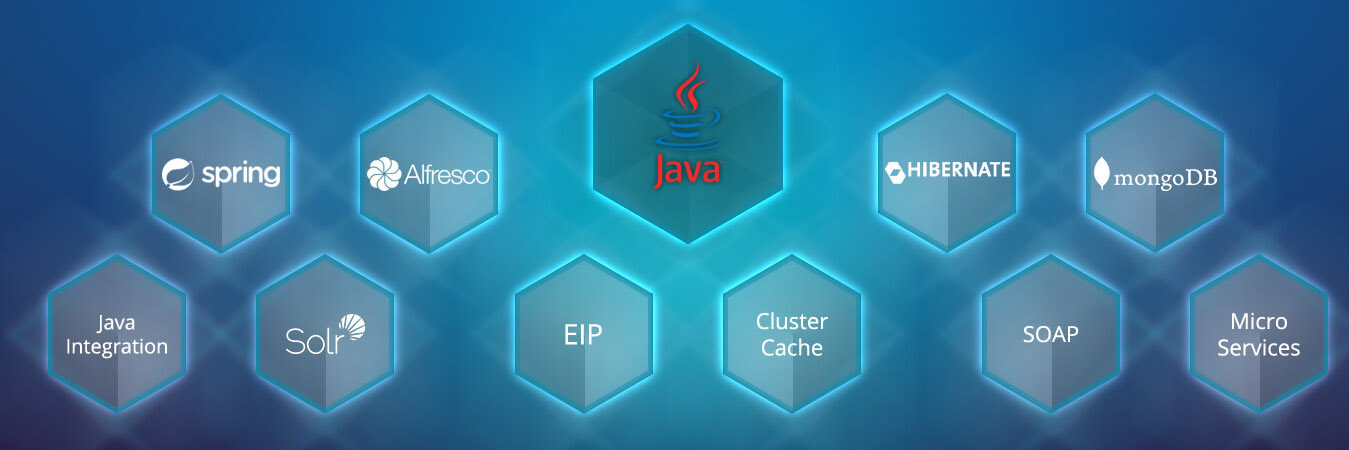Experience the benefits of Advance Java Programming

Advance Java is a widely used programming language expressly designed for use in the distributed environment of the internet. It is the most popular programming language for Android smartphone applications and is also among the most favored for the development of edge devices and the internet of things. Java was designed to have the look and feel of the C++ programming language, but is simpler to use and enforces an object-oriented programming model. Java can be used to create complete applications that may run on a single computer or be distributed among servers and clients in a network. It can also be used to build a small application module or applet for use as part of a webpage.
Java Training Package
C Language
- History and Tokens of C
- Control Statements
- Functions
- Control Flow
- Pointers
- Arrays and its Types
- Dynamic Memory Allocation
- Structure and Union
- File Handling
- Command Line Arguments
C++ Language
- Object Oriented Programming
- Difference of C and CPP
- Classes and Objects
- Constructor and its Types
- OOPS Concept
- Friend, Inline and Static Functions
- Generic Functions (Template)
- Exception Handling
- File I/O
- Type Casting and RTTI
Core Java
- Java History,Features and Versions
- Java Applications
- Classes and Objects
- OOPS Concept
- Java Arrays
- Writing simple program in java
- Java Packages
- Java Lang Package
- Java 8 and Java 9 Features
- Abstract Classes and Interfaces
- Inner Classes
- Exception Handling
- Multithreading
- Collection and Generics
- File I/O
- Socket Programming
- Applet
- AWT and Event Handling
- GUI Designing-Swing
- JDBC
Advance Java with Frameworks
- Java Servlet
- Java Server Pages
- Cookies
- Sessions
- EJB
- Spring
- Hibernate
- Struts
- Web Services APIs
Core Java :-
- Introduction to Java and OOPS
- Java Tokens- Comments, Identifiers, Keywords, Separators
- Working with Java Editor Softwares – Editplus, NetBeans, Eclipse
- Packages with static imports
- Working with jar
- Modifiers – File level, Access level and Non-access level
- Datatypes, Literals, Variables, Type Conversion, Casting & Promotion
- Reading runtime values from keyboard and Properties File
- Operators and Control Statements
- Method and Types of methods
- Variable and Types of Variables
- Constructor and Types of constructors
- Block and Types of Blocks
- Declarations, Invocations and Executions
- Compiler & JVM Architecture with Reflection API
- Static Members and their execution control flow
- Non-Static Members and their execution control flow
- Final Variables and their rules
- Classes and Types of classes
- OOPS- Fundamentals, Models, Relations and Principles
- Coupling and Cohesion (MVC and LCRP Architectures)
- Types of objects & Garbage Collection
- and Var-arg types
- Enum and Annotation
- Design Patterns
- API and API Documentation
- Fundamental Classes – Object, Class, System, Runtime
- String Handling
- Exception Handling and Assertions
- Multithreading with JVM Architecture
- IO Streams (File IO)
- Networking (Socket Programming)
- Wrapper Classes with Auto boxing and unboxing
- Collections with Generics
- Java 5, 6, 7, 8 new features
- Inner classes
- AWT, Swings, Applet
- Regular Expressions
- Formatting date, time (java.text package)
ADVANCE JAVA:-
- JDBC
- Introduction to JDBC
- JDBC architecture
- java.sql Package
- Connection, Statement, ResultSet
- Prepared Statement
- Callable Statement
- Scrollable and Updatable ResultSet
- Batch Updates
- ResultSetMetaData
- Simple Transaction Management
- Four Levels of JDBC drivers, their pros & cons
- Features of JDBC 3.0/4.0
- Need of Server side Programming
- Introduction to Servlets
- Servlet Life Cycle
- javax.servlet package
- ServletConfig, ServletContext, ServletResponse
- Supplying initialization parameters to Servlets
- Performing database operations in Servlets
- Include and forward mechanisms
- Applying filters to Servlets
- javax.servlet.http Package
- HttpServlet Life Cycle
- Http request methods GET vs POST
- HttpServletRequest, HttpServletResponse
- Dealing with Http headers & error codes
- Session Tracking, purpose
- Hidden form fields, Cookies
- Http Session, URL rewriting
- Event listeners
- Web application security
- Disadvantages of Servlets
- Introduction to JSP
- JSP Life Cycle
- Creating dynamic Web content with JSP
- Scripting elements
- Scriptlet
- Declaration
- Expression
- XML syntax for JSP elements
- JSP directives page, include and taglib
- JSP implicit objects
- JSP scopes
- Include and forward mechanism
- Using a Java bean in a JSP
- JSP Model 1 architecture
- JSP Model 2 (MVC) architecture
- Custom Tag Development
- Classic Tags, Simple Tags
- Error Handling in a JSP
- JSTL
- Expression Language
- Processing XML in a JSP




